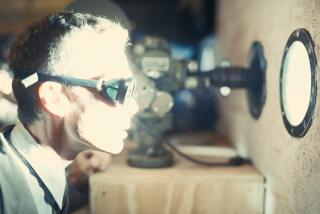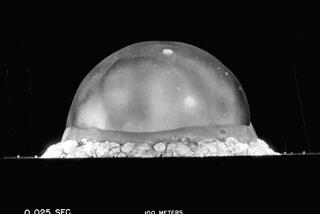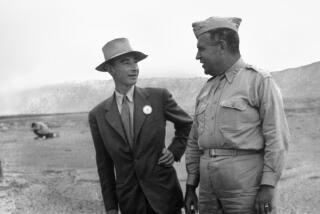Boyce McDaniel, 84; Worked on A-Bomb
- Share via
Boyce D. McDaniel, the Manhattan Project physicist who was the last man to check the atomic bomb before the first test of the device in July 1945, has died. He was 84.
McDaniel, who also had a distinguished career at Cornell University, died of a heart attack May 8 in Ithaca, N.Y.
For the record:
12:00 a.m. May 26, 2002 For The Record
Los Angeles Times Sunday May 26, 2002 Home Edition Main News Part A Page 2 National Desk 0 inches; 30 words Type of Material: Correction
McDaniel obituary--The obituary Monday of physicist Boyce D. McDaniel misstated the year he became director of Cornell University’s nuclear studies laboratory. It was 1967.
He had just finished his PhD work at Cornell in 1943 when he was invited to join the Manhattan Project team.
McDaniel was paid $250 a month and worked 10- to 15-hour days at the secret Los Alamos, N.M., facility.
As part of the cyclotron research team, he played an important role in helping to identify the amount of the isotope uranium-235 needed to create the atomic fission to detonate the world’s first nuclear bomb. By the summer of 1945, enough U-235 and sufficient plutonium-239 had been processed to create the bomb.
The test was scheduled for 4 a.m. on July 16, 1945, at the Trinity site on the Alamogordo Bombing Range in the New Mexico desert.
One of McDaniel’s tasks was to check the bomb’s radiation levels every few hours. The bomb, which many of the scientists referred to throughout its development as “the gadget,” had been placed atop a 100-foot metal tower.
Just before 1 a.m., McDaniel climbed the tower to make one of his final checks. He recalled later that the climb was a bit dicey.
“During the evening, a misting rain had been falling, and by the time I started up [the tower], there were thunderstorms playing around the site with frequent flashes of lightning followed by rolling thunder. With considerable fear and trepidation, I made the trip to the top and returned safely, heaving a sigh of relief.”
He was the last man to touch the bomb before it was detonated at 5:29:45 a.m., in what was then called Mountain War Time.
McDaniel recalled that he and his colleagues “stared intently into the darkness. Then came the last minute countdown .... Finally, the brilliant flash of an ever-growing sphere was followed by the billowing flame of an orange ball rising above the plain.”
Within a month of the test, bombs were dropped on Hiroshima and Nagasaki, and Japan agreed to surrender.
After the war, McDaniel joined the Cornell faculty and became a full professor in 1955. He was instrumental in establishing the university’s nuclear studies laboratory, and in 1972 became director, a post he held until he took emeritus status in 1985.
Along with his Cornell colleague Robert Walker, McDaniel invented the pair spectrometer, a key tool in measuring gamma ray energies. He also helped design the university’s 300-megavolt electron synchrotron, among the first such accelerators in the world.
Well-respected in the scientific community, McDaniel took a leave of absence from Cornell in 1972 to become acting head of the accelerator section at the Enrico Fermi National Accelerator Laboratory. The facility, located in Batavia, Ill., had been having severe trouble with component failure, and as a result, intermittent operation. Under McDaniel’s leadership, the accelerator problems were solved, and in short time, the facility was running in a productive manner.
Born in Brevard, N.C., Boyce Dawkins McDaniel grew up in Chesterville, Ohio. He earned a bachelor’s degree from Ohio Wesleyan University in 1938, and a master’s degree from what is now Case Western Reserve in 1940.
For his PhD from Cornell, McDaniel researched the absorption rates of neutrons in the element indium.
In 1953, he was a Fulbright scholar at the Australian National University in Canberra. In 1959, he was Guggenheim Fellow at the University of Rome and the National Laboratory in Frascati, Italy.
He was a member of the National Academy of Sciences, the governing board of the Brookhaven National Laboratory and of the Department of Energy High Energy Advisory Panel, a governing board member of Fermilab and chairman of the Superconducting Supercollider Board of Overseers.
McDaniel is survived by his wife, Jane, a son and a daughter.





